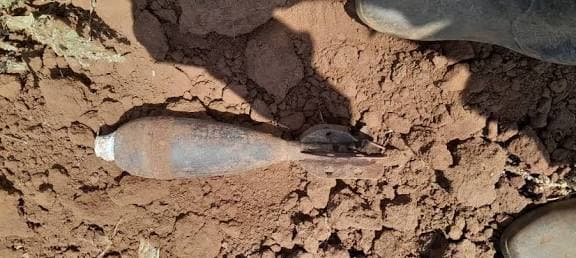We're loading the full news article for you. This includes the article content, images, author information, and related articles.
The discovery of a live 80mm high-explosive shell in Kikuyu highlights the persistent, deadly legacy of unexploded historical ordnance threatening Kenyan communities. The national bomb disposal unit has moved the device for safe detonation.

A farmer preparing his land for planting discovered a live 80mm unexploded artillery bomb in Kiambu County on Thursday, prompting a major security operation that concluded on Friday with the device being removed for safe disposal. The incident in Nduma village, Kikuyu, has underscored the latent dangers of historical munitions that still litter parts of Kenya.
The farmer, identified as David Muiruri, a resident of Kerwa Sub-location, unearthed the brown, metallic object while harrowing his farm with a tractor at approximately 11:00 AM EAT on Thursday, 23 October 2025. Recognizing the potential danger, Mr. Muiruri photographed the device and immediately reported the finding to the Kerwa Police Station.
Officers from the station, led by Chief Inspector Lydia Rutoh, promptly responded by cordoning off the area to secure it from public access. On Friday, 24 October 2025, a specialized team from the Directorate of Criminal Investigations (DCI) National Forensic Bomb Disposal Unit was dispatched from Nairobi to manage the high-risk situation.
Speaking to the media at the scene, Kikuyu Sub-County Police Commander Joseph Ndege confirmed the device was an active 80mm high-explosive artillery shell, colloquially known as an '80 mic mic', believed to be a remnant from the colonial era.
“The threshold at which it can explode is to an extent of more than 50 meters,” Commander Ndege stated, explaining the decision not to conduct a controlled detonation at the farm. “It has been recommended that this ordinance be exploded somewhere safer, preferably in Kanyonyo, but we shall leave that to the experts to determine further.”
The bomb disposal unit safely secured the explosive and transported it from the village for further analysis and eventual destruction at a secure location. No injuries or property damage were reported.
This discovery is not an isolated event but part of a troubling pattern of unexploded ordnance (UXO) being found across the country, posing a continuous threat to civilians decades after conflicts have ended. These remnants are often unearthed by unsuspecting farmers, construction workers, or even children.
In April 2025, a similar incident occurred in Hellu Ward, Marsabit County, where 23 live mortar bombs, also suspected to be from the colonial period, were discovered by locals. That discovery also prompted a response from Kenya Defence Forces (KDF) bomb experts.
The issue of UXO is a deadly legacy not only of the colonial era but also of military training exercises. For decades, communities in areas like Samburu and Laikipia have faced grave dangers from munitions left behind after training drills by the British Army Training Unit Kenya (BATUK) and the KDF. Investigations by journalistic outlets and human rights groups have documented numerous cases of death and serious injury to Kenyan civilians, including children, from accidentally encountering these devices. In 2022, it was reported that over 50 such items had been found in the Archers Post area alone that year.
The Kenya Police Service's Bomb Disposal Unit (BDU), established in 2002, is the lead agency tasked with responding to these threats. Working in coordination with the Anti-Terrorism Police Unit (ATPU), the BDU is responsible for handling, defusing, and investigating explosive devices. The unit has received specialized equipment and training from international partners, including the United States, to enhance its capacity to manage these hazardous situations.
Following the successful operation in Kikuyu, authorities have reiterated calls for public vigilance. Commander Ndege urged citizens to immediately report any suspicious metallic objects to the nearest police station and to refrain from handling them under any circumstances to prevent potential tragedies.
Keep the conversation in one place—threads here stay linked to the story and in the forums.
Sign in to start a discussion
Start a conversation about this story and keep it linked here.
Other hot threads
E-sports and Gaming Community in Kenya
Active 9 months ago
The Role of Technology in Modern Agriculture (AgriTech)
Active 9 months ago
Popular Recreational Activities Across Counties
Active 9 months ago
Investing in Youth Sports Development Programs
Active 9 months ago